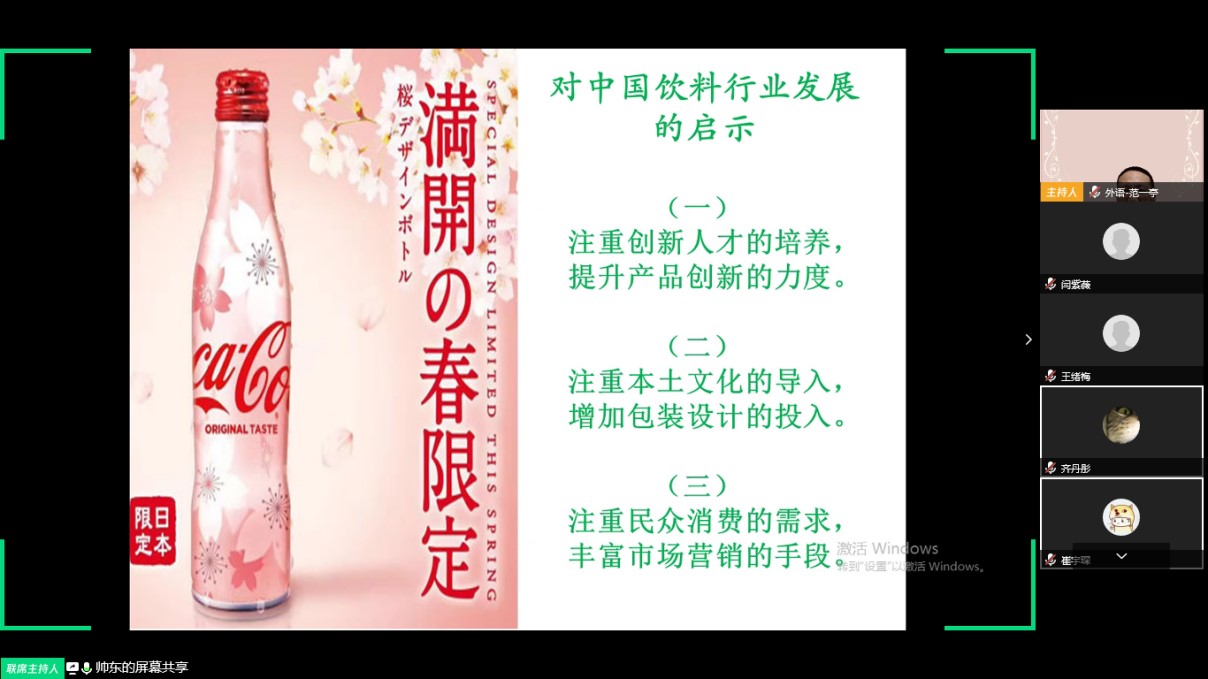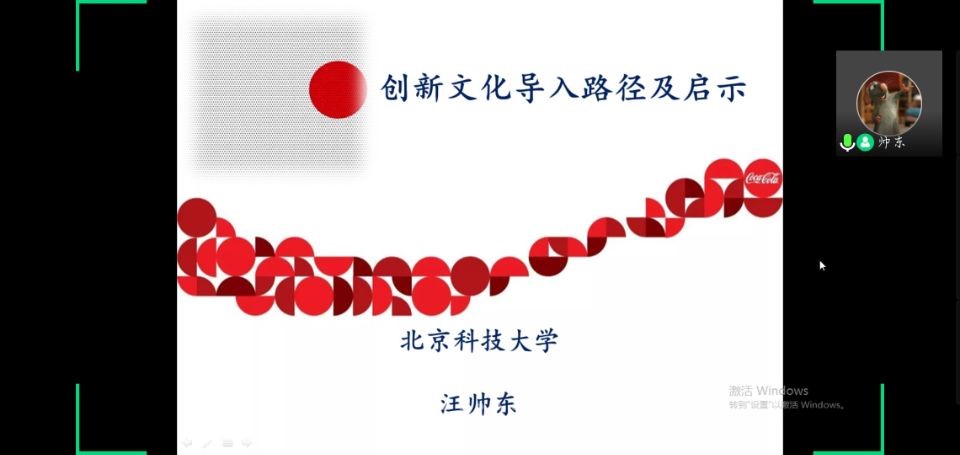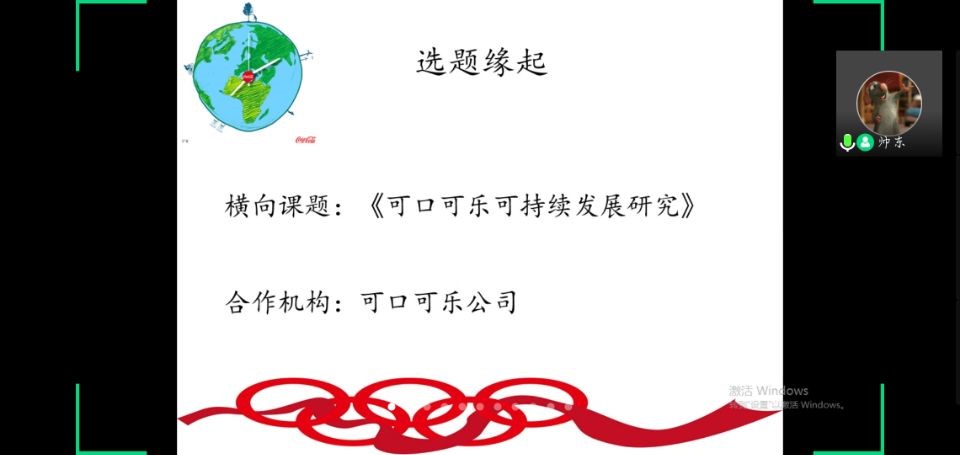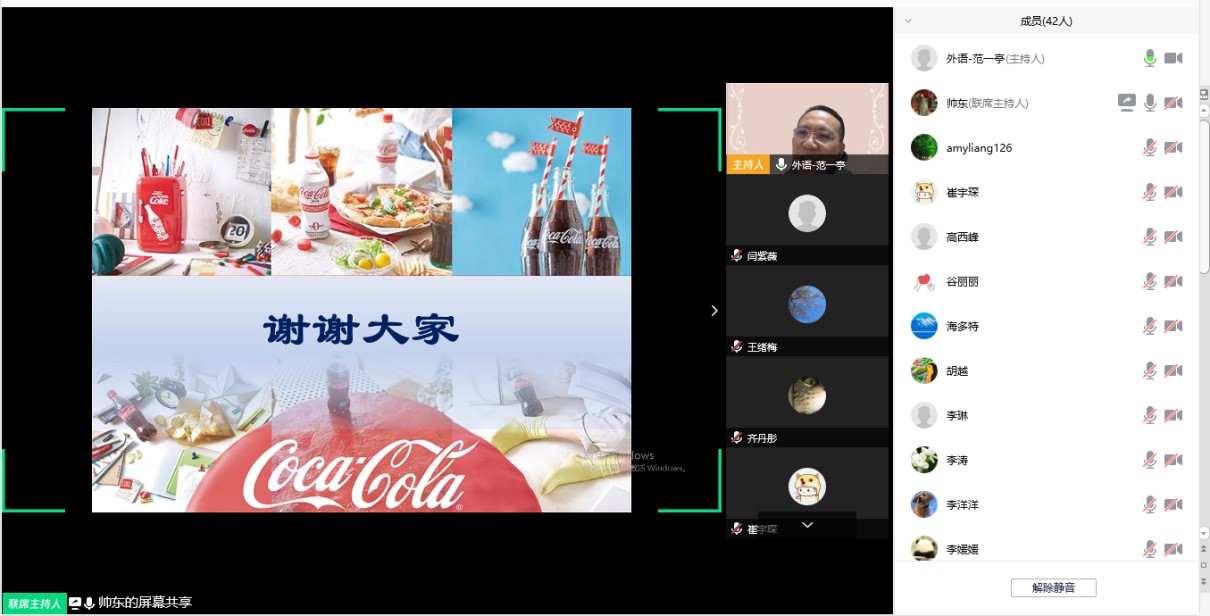Scientific Research Sharing— the SFS Teachers’ Academic Salon Was Held

At 12:30 on April 9, 2020, the sharing event of scientific research salon on literature and culture of the SFS teachers was held as scheduled through Tencent Meeting. During the event, Wang Shuaidong in Department of Japanese shared his latest academic research results with the teachers and students. While explaining his paper The Introduction Path and Enlightenment of Coca-Cola Innovation Culture in Japan in detail, Mr. Wang helped everyone think and gain enlightenment. This event was hosted by Fan Yiting, vice dean of the SFS. Teachers, postgraduates and doctoral students from the SFS participated in the event.

At the beginning of the event, Wang Shuaidong explained the purposes of this sharing. First, Coca-Cola had developed with our generations. It was an iconic symbol in our memory and history cordial chronology and mnemonic symbol, which could easily evoke a sense of resonance and participation. Second, as the first academic event of this semester, this topic could brought lightness and enjoyment, which could help everyone relieve the fatigue of teaching and the pressure of writing. Afterwards, Wang Shuaidong explained the reasons for choosing the topic. After a lot of researches on the business performance, innovation, social responsibility and strategic communication of the global beverage industry, hefound that Coca-Cola Company Coca Cola is one of the most innovative companies , especially its Japanese branch, which inspired his research interests in culture-driven product innovation - of the Japanese Coca-Cola Company.

Then Wang Shuaidong anazlyed his research paper. Based on the two perspectives of corporate management and cultural communication, his research systematically investigated the introduction path of cultural elements of the Japanese Coca-Cola in product and packaging innovation and its enlightenment to the development of China’s beverage industry. The whole paper was divided into six parts, including introduction, cultural background, product innovation rooted in local culture, consumer-led packaging innovation, enlightenment and conclusion of the development of China’s beverage industry. Wang Shuaidong analyzed the paper from five dimensions— Japanese traditional tea food culture, public health concepts, internal and external market demands, Japanese corporate culture, and natural geographic environment. He believed that packaging innovation was promoted layer by layer in a consumer-oriented way, such as stimulating consumers’ desire for communication, triggering consumer discussion, paying attention to hot issues and catering to consumers. In accordance with this research, Wang Shuaidong further proposed that for China’ beverage companies, Coca-Cola’s innovative thinking and path had good reference value and significance. In other words, “three emphasis” should be taken in the innovation process: cultivating innovative talents and encouraging product innovation; integrating products with local culture and increasing investment in packaging design; focusing on consumer demand and enriching marketing methods.

After the sharing, teachers of the SFS put forward their views on some of the issues involved in the paper. Associate Professor Fan Yiting raised two questions: 1) how to start write an article, how to classify, what kind of the theoretical reference, or the reference of previous studies; 2) compared with Japanese companies, what the shortage of innovation between American Coca-Cola company and Chinese Coca-Cola Company was Wang Shuaidong gave his answers in terms of the structure of the research paper and length limitation. At the same time, he also commented on the shortcomings of Chinese enterprises, and proposed that Chinese enterprises should not onlyattract talents, but also retain talents. Later, Professor Liang Xiaohui put forward ideas on Wang Shuaidong’s paper and Fan Yiting’s questions. Liang Xiaohui reminded that students should think about the theory and culture; cultivate innovative ability, the awareness of innovation, and sense of responsibility; students should realize that innovation is not a slogan. We need to keep the core culture in mind and stay innovative based on the principle of adherence to. At last, Professor Yin Jing put forward suggestions for the improvement to Wang Shuaidong’s paper. She believed that Wang Shuaidong can search for the causes of Japan’s innovation, for example, the subjectivity of the Japanese under the economic and military control of the United States after World War II. She suggested that the paper explore the construction of the main identity of the Japanese and the influence of the cultural imagination shaped by the colonial history of Japan on its awareness of innovation, as well as the current youth identity construction from the perspective of the US dominated neocolonialism

Teachers and students of the SFS benefited a lot from the exchanges and sharing, and the event was a great success.
